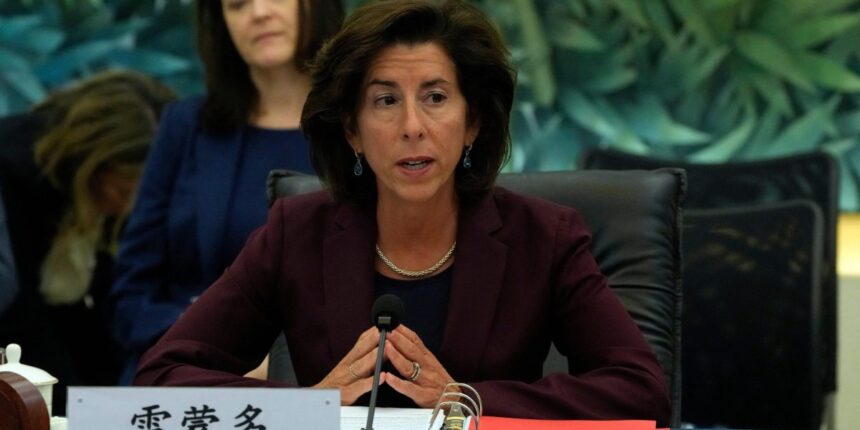
Gina Raimondo’s visit to China this week involves the Commerce secretary walking a political tightrope so taught it might snap at any moment. She had to try and smooth over a tense U.S. China relationship while at the same time not appearing in any way lenient on national security issues. But try as she might, she kept on giving off a certain unmistakable message: We’re just not that into you.
During the course of her visit, Secretary Raimondo, who is the fourth high-level official from the Biden administration to visit China this year, reiterated the importance that economic ties play in the relationship between the world’s two largest economies.
Raimondo sought to be unequivocal in her support for a continued relationship.
“I want to be clear that we do not seek to decouple or to hold China’s economy back,” Raimondo told Vice Premier He Lifeng. She added that she and her counterpart, Chinese Commerce Minister Wang Wentao, agreed to “talk informally and as frequently as would be helpful” to revive interaction on trade.
But there were several big catches.
First, Raimondo relayed a message from the business community: China is an increasingly unwelcoming place to do business.
“Increasingly I hear from businesses, ‘China is uninvestable because it’s become too risky,’” she said. “There are the traditional concerns that they’ve become accustomed to dealing with. And then there’s a whole new set of concerns, the sum total of which is making China feel too risky for them to invest.”
The new policies combined with China’s faltering economy have made foreign investors skittish about investing in the mainland. Over the weekend, the government passed a series of measures meant to rejuvenate its economy only for foreign investors to sell off $1.1 billion of Chinese equities. In the past China had placed limits on selling securities when markets looked rough, another in a string of recent policies that likely made investors nervous about doing business in the world’s second largest economy.
Raimondo went into more detail in Beijing, underscoring how difficult recoupling, or preventing decoupling, could be.
Those pesky export controls
Despite what Raimondo said about decoupling or lack thereof, things have gotten significantly less close over the past several months.
In April, the Chinese government passed a new anti-espionage law that banned the transfer of any information related to the country’s national security and broadened the definition of spying. The U.S. accused China of keeping the law intentionally vague and expressed concerns that it might hurt American companies.
U.S. officials in turn also implemented a series of measures to address growing concerns over China’s potential threats to national security. For starters, the U.S. implemented a ban on sharing semiconductor technology with certain Chinese firms over fears that the technology might be used for military and surveillance purposes. The U.S. says the decision was made in the interest of national security, not to harm China economically.
Raimondo adamantly reinforced this point. “The United States is committed to being transparent about our export enforcement control strategy,” she said. “I want to be clear. We are not compromising or negotiating in matters of national security — period.”
China retaliated against the U.S. export controls by ordering certain Chinese companies to stop using memory chips from Micron Technologies. At the time, Raimondo called the move “economic coercion,” some of the bluntest language she’d used to decry China’s alleged habit of using its economy to further its political aims. On this trip, Raimondo criticized what she considered an arbitrary enforcement of Chinese policies against U.S. companies like Micron. “Our export controls are clear and transparent,” she said. “There’s been no rationale given around what’s happened to Micron. There’s been limited due process, and that’s why I brought it up.”
The U.S. has also placed restrictions on exports from Nvidia, the leading chip manufacturer in the world. Nvidia’s business has soared on the backs of the recent A.I. boom.
Lately, America has also laid the groundwork to wean itself off of a reliance on Chinese manufacturing for another hot-button industry: electric vehicles. The U.S. is eager for electric carmakers to move their supply chains away from China, according to Reuters. A law banning the importation of products manufactured in the Xinjiang province—where there have been reports that members of the region’s Uyghur minority have been sent to forced labor camps—now encompasses electric vehicle batteries.
These sort of moves have all been part of the U.S. government’s efforts to steer investments away from China. All while, reinforcing the idea that a mutually beneficial economic relationship will be the first step in easing other tensions between the two countries.
“The plan and the hope is that the commercial relationship, done right, can stabilize the political relationship,” Raimondo said.
Chinese Premier Li Qiang, the country’s second-highest-ranking official, echoed the sentiment, calling the trade between the two countries the “anchor of stability.”








